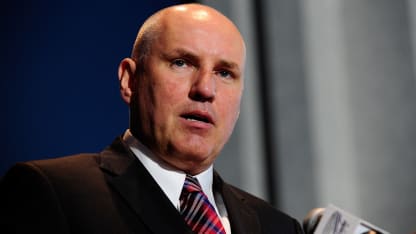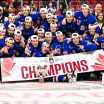The 2017-18 NHL season has passed its midway point, and the 2018 NHL Trade Deadline on Feb. 26 is less than six weeks away. With that in mind, NHL.com is sitting down this week with some of the biggest names in the game. Today, St. Louis Blues general manager Doug Armstrong talks about how he plans on being busy heading into the deadline -- but not if it involves a rental player.
Blues GM not interested in acquiring rental players
Armstrong hopes to make moves at Trade Deadline with eye toward future

© Jeff Curry/Getty Images
By
Mike Zeisberger
NHL.com Staff Writer
TORONTO -- A season ago, St. Louis Blues general manager Doug Armstrong was in sell mode at the NHL Trade Deadline, trying to trade defenseman Kevin Shattenkirk, who was due to become an unrestricted free agent on July 1.
As he worked the trade market, Armstrong tried to convince his fellow GMs on the high value of a rental player like Shattenkirk.
Anything to drive up the price.
It worked. He traded Shattenkirk to the Washington Capitals on Feb. 27 for two players, a first-round pick in the 2017 NHL Draft and conditional draft picks.
Now Armstrong, with the Blues one point out of first place in the Central Division, is an eager buyer who wants nothing to do with rental players.
Note the irony? Armstrong certainly does.
"I can see how it looks," Armstrong said. "But there is logic to how we are approaching things this year.
"I don't see us involved in the rental market. Now that can always change with the proper phone call and a scenario in which the assets we have to give up are something we can live with. But to get a player for six weeks and hope you are going to go on a run, well, the teams that have done that recently really haven't been that successful.
"I would like to make a trade, especially if we're going to get a player like we did a few years ago with [defenseman] Jay Bouwmeester where you get him for one or two additional playoffs more."
When the Blues acquired Bouwmeester in a trade with the Calgary Flames for a two players and first-round pick in the 2013 NHL Draft on April 1, 2013, he was in the fourth year of a five-year $33.4 million contract. The Blues signed him to a five-year extension Aug. 1, 2013.
"Another example like that is the way (Pittsburgh Penguins GM) Jimmy Rutherford acquired Phil Kessel from the Maple Leafs a few years ago," Armstrong said. "It was during the offseason and he was on a multiyear contract, so he had him for a long time.
"If you trade for rentals, well, only one team is going to win the Cup and you want to have a long run. So I would say we are going to be involved in talks for players who are going to be in our training camp next summer."
Earlier this week, Rutherford predicted asking prices for players would start steep and remain that way when the deadline approaches. Armstrong said he doesn't necessarily agree.
"I see the asking price being high but I'm not sure they're going to get it when it comes down to it," he said. "It reminds me of most years in which if you are a seller, you start with an asking price and if you get it, you'll move quickly. I think there will be movement but I'm not sure the prices will stay what they're asking for.
"And I know if they do, we won't be involved."
As Armstrong weighs his options ahead of the trade deadline, he took time to discuss a number of topics with NHL.com.
On trading Shattenkirk to the Washington Capitals in February for forwards Zach Sanford and Brad Malone, a first-round pick in 2017 and conditional draft picks
"It was an interesting dynamic because we had a trade worked out with one team the summer before pending him signing a contract with them. And he wasn't completely comfortable with that. And then we had another one in early February he wasn't completely comfortable with. And I certainly respected Kevin's stance. He had played a long time, he was going to be a free agent and he wanted to see what's out there. We had talked to him about staying with us too. What I respected about Kevin is that it wasn't about the money. We have [defensemen] Colton Parayko and Alex Pietrangelo. He wanted a better opportunity to expand his game and it wasn't going to come with us.
"I felt there was going to be a proper market for him. I felt there was going to be a higher market if I could find the right place where he could sign an extension. The value certainly would go up. But when we couldn't work out something with that second team, we understood it would be a rental market and adjusted."
On reaching the Western Conference Second Round last season despite being sellers at the deadline
"Obviously it worked out very well in still making the playoffs. We knew we were solid on the back end with Parayko and Pietrangelo. Where we missed Kevin was on the power play. I think he's the best right-handed defenseman in the League on the power play. You don't just replace those guys. But our 5-on-5 game we felt would stay strong because we felt we had some replacement players there. It was nice to make the second round. We're not happy we didn't go past the second round but we're happy we made the playoffs."
On how the expected jump in the NHL salary cap this summer could affect the current trade market
"I think what you find now is that it's a League where development is mandatory. You have to have young players coming up in a cap system. This year they're talking about the cap escalating back like it did three or four years ago. That's a huge step. The past few years it's only gone up by $1 million -- this time it's about $4 million. That's a big jump. You might be able to get more aggressive with players. But I still say it's a league where you have to develop."
On signing a four-year contract extension in December
"Talking to the ownership I felt this was going to get done. I've got to say, I wasn't really worried about it one way or the other. I've said this to a number of people including Mr. Stillman (Blues owner Michael) on a number of occasions: 'If you're the only one who wants to give me a job, then there's your answer: You probably shouldn't be giving me a job.' So I feel comfortable that I've worked hard in the NHL. And that I would land on my feet regardless. So I felt it would get done in St. Louis but I wasn't really worried about it."
On how the torch is being passed from the old guard like forward Alexander Steen and Bouwmeester to young players like Parayko and forward Jaden Schwartz
"That's something my predecessors deserve credit for. There's a real family atmosphere in St. Louis. The person I got it from the most was David Backes. I watched him pour so much into Alex Pietrangelo. David made sure that if he wasn't going to be here, he wanted to make sure that Alex was a pro, understand the League, and working on leadership. Troy Brouwer was with us for a very short time, but he did a lot of work helping the Robby Fabbris of the world. So right now we have Alex Steen and Paul Stastny and Jay Bouwmeester who are taking a lot of pride in helping out that younger group. They're important players for us but they also take pride in making sure the Jaden Schwartzes, the Vladimir Tarasenkos, the Paraykos, they all are taken care of. Now we have an even younger generation of players coming in like the Robby Fabbris. They're preparing the next generation and you don't see that in all organizations. That's something I picked up in St. Louis and that's something we take pride in."

















